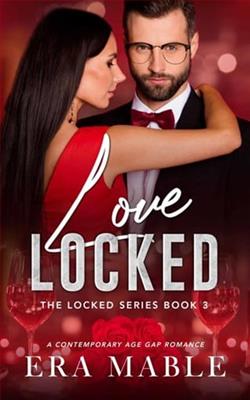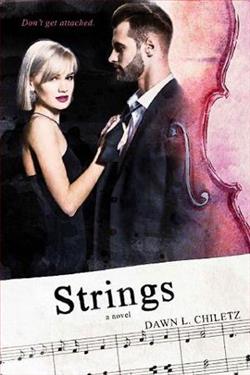Page 101 of The Princess and the Fraud
Aaron Astor was coming apart at the seams, body tight as a cello bowstring as he held himself back. Both of his arms were rigid, but his expression was so open and filled with a rawness that I couldn’t look away. I didn’t want to. “Because I like you, Aaron Astor.”
His breath caught. His eyes fluttered shut, as if the words were too much to process. I wondered if he’d ever heard those words like that before, in this context. Probably not. Aaron, who had never been in love, who thought he wasn’t meant for it, surely never had someone confessing to him before.
The thought made me want to say them again, to make him feel it. So I did. In a little whisper, with my fingers tender against his, I repeated, “I like you.”
His silence was long enough that I thought he was about to reject me—to shrug me off, to tell me he didn’t feel the same way.
But when Aaron closed his eyes and sighed, it was as if, like me, something unlocked inside him. A dam thatI’dpulled apart brick by brick. My words had just ripped free a structurally necessary piece of his last wall, and now there was no holding it back.
Aaron surged forward, back up onto his knees, pushing me back into my chair as he returned my kiss with his own. He reclaimed my lips with a fervent, desperate kiss, as if he were starving and I was the only thing that could satisfy him. He ripped his hands out from underneath mine, lifting to reclaim their spot on either side of my face, holding me to him. His touch was intense, almost frantic, like he couldn’t keep himself back any longer.
There was no uncertainty in his kiss, no vagueness—nothing but passion that matched mine in equal measure, as if my playing had drawn out a foreign desire of his own.
Inexplicably, I thought of Élégie’s op 24. The piece built from a quiet, sorrowful murmur to a desperate and impassioned cry, the cello’s voice growing in power and urgency, soaring above the piano’s insistent chords. The piece was raw and exposed, as though every hidden yearning and unspoken ache had been brought to light.
I imagined playing that piece now, composure shattering just as the crescendo did, leaving me unable to think straight. I curled my fingers through the mess of dark locks at the nape of Aaron’s neck, pulling him as close as I could. My lips touched his as if they were pressing against a cello string, eliciting the low notes of the instrument.
And, in the madness of the cello’s peak, the piano was just as uncontrolled. Aaron’s right hand traced its way from my cheek to the curve of my shoulder, hesitating there, pressing lightly along the top of my collarbone where my cello neck had sat. He dragged his thumb along the skin that my polo left exposed, as if he were drawing along the cello strings. Fire raced down my spine as he moved on, hand slipping down my side to secure his hold at my waist. All five of his fingers were splayed wide, wrapped around my hip, causing me to gasp against his mouth.
In Élégie’s piece, the piano notes were a steady, fierce force against the cello’s wave of melody, the two pairing together, propelling toward a breaking point. Aaron’s fingers were like that now, mimicking the way he played the piano, tracing the keys to draw out the music.
Only this time,Iwas his piano, and my gasps were the notes he sought.
I wanted to burn this moment in my brain, the brimming happiness and need and fire and music, because I wanted to feel this over and over. I’d never be able to listen to Élégie’s piece again, not without thinking of this moment. For the first time in years, in Aaron’s arms, I truly feltalive.
And then we broke apart with a gasp. Aaron leaned back ever so slightly, but I chased the distance and leaned my forehead down to his, savoring in the breathless rise and fall of his chest. Aaron’s hand still lingered at my hip, my fingers still wound in his hair, and we were caught in the aftermath of the crescendo, the piano and cello slowly ebbing into quiet resignation.
Aaron’s eyes were closed, but mine were open, committing every inch of him to memory. Pressing my fingers against the skin of his neck, I whispered, “Marry me.”
And just like that, as Aaron went rigid, the lingering music found its way to completion, leaving nothing but silence. Aaron didn’t move, but his eyes did open, though they didn’t lift to mine. His fingers on my hip had become a softer pressure, as if he was about to let go.
“Marry me,” I murmured again, this time with a bit more strength. “I mean it. I won’t take it back this time.” I chuckled a little after the last line, hoping it’d loosen him up. He didn’t react. “I—I know I’m not like Fiona. I’m not rich, and I don’t have a business you can run, but you and I could?—”
He looked at me, lips still slightly parted, but his expression was darker now, more serious than I’d ever seen it. “Why…” He started low, but trailed off, almost as if he didn’t want to speak whatever it was aloud. “Why did you take it back the first time?”
This wasn’t the first time he’d asked, either, but I hadn’t answered it before. “I?—”
“When you told me to marry you. You were panicked when you took it back before. Why?” He wasn’t angry, but there was a quiet intensity to his voice, as if heneededto know the answer.
“I mean, a lot of things had happened—the elevator getting stuck, running into Grant?—”
“You didn’t want to marry me.” He looked up at me, lips red and cheeks pink, but expression gravely serious. “What changed?”
He was acting as if I was about to sayjust kiddingagain, as if it couldn’t possibly be real. Then again, it wasn’t like I had the greatest track record. I brought my other hand up, smoothing back his dark hair. “You want to know why I changed my mind?” I asked him gently, smoothing my thumb along his jawline. “I hate the idea of you marrying Fiona. I hate thinking about you being stuck with someone like her. I hate thinking about you doing it even though you don’t want to. Marry me instead.” And just as I’d wanted to before, I raised both of my hands to rest lightly along the sides of his face, holding his gaze to mine. “Make the catastrophic choice, and marry me instead.”
My words had almost the opposite effect I wanted them to. Aaron’s eyes were so hollow; the dark color went deep, but there was no light to fill them. I wanted to shake him awake, because surely, he just wasn’t understanding me. He didn’t have to marry Fiona. I wouldn’t back out this time. This time, I meant it. But the quiet horror on Aaron’s face was unmistakable.
Aaron’s hand fell from my hip, and the absence of pressure made me feel free-floating. “She said you’d say that,” he all but whispered, more to himself than to me.
“What? Who said that?” I frowned. “Fiona?”
But Aaron didn’t answer.
I didn’t know why Aaron was so panicked by the offer, but I didn’t push or pry it out of him. Just as I needed to come to terms with everything regarding my mother’s house over time, I’d let him find his own way. “If you need time to think about it, you can.” I combed my fingers through his hair, tracing his face, trying to chase away the anxiety that clearly gnawed at him. “You have a week, after all. But I won’t take it back this time. I promise.”
Let’s jump together, I thought, pulse stirring in my chest.Together.
And then I leaned down and pressed a kiss to his forehead, feeling him tremble beneath my lips. When I pulled back, Aaron sat onto his heels, slipping out of reach from my hands, and they fell into my lap. I stood, picking the cello up from where he’d set it down, and carried it over to its hard case. The magic from the moment had dissipated slightly, but I refused to give it up entirely—refused to givehimup.















